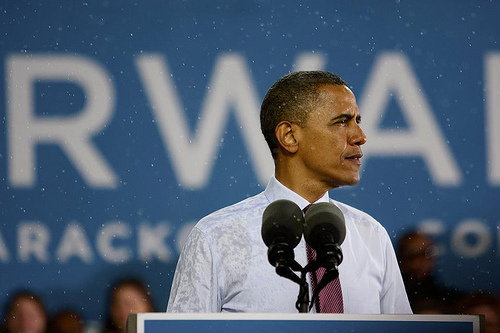What an odd moment Barack Obama’s collapse in Wednesday’s TV debate was, much like Robert Redford’s in The Candidate. We all have go-to cultural images and that’s one of mine. In the 1972 film, Redford starts as an idealistic candidate who learns to make all the right, unprincipled moves but loses the script at a crucial point: the big TV debate, and blurts out some things he really believes.
It’s not perfect. I don’t think Obama has suppressed his real ideals. I think the late Alexander Cockburn got it right in suggesting Obama had no idea what he’d do as president, other than helping people play together nicely. But on Wednesday he seemed to be hazy on even small differences: the right not to have health insurance cut off if you’re sick, gays in the military, better loan terms for students. Mostly, I thought, he lacked conviction in the early going on his plan to revive the economy and jobs. That’s because he doesn’t have one.
On the crucial issue that created this crisis — the takeover of the economy by banks and financiers — there’s no daylight between parties or candidates. They all view it as immutable. In fact, it was a Democratic president, Bill Clinton, who abolished controls on banking going back to the Great Depression, enabling the financial catastrophe of the Bush years. The new controls (“Dodd-Frank“) under Obama are far weaker and continue to be gutted as we speak. When Clinton said U.S. voters should blame him or Bush rather than Obama for the collapse, he spoke true, while posturing as if he was taking one for the current prez.
There are differences, but not on those basics at the heart of the crisis. The main one, I’d say, is that Democrats like Clinton and Obama don’t oppose, and even like, providing a small cushion at public expense, in areas like health and education, for those at the bottom of the heap, while Republicans oppose it, on principle. This makes a difference in people’s lives and it would be a shame to lose what small supports are there, but none of it will affect the dynamics that keep magnifying social inequality — a word Obama won’t even say.
So what happened at the debate? It’s as if Obama had difficulty acting as if that small difference makes much difference. This may be to his personal credit. But when your appeal to voters is based on asking them to believe you and you don’t seem to believe yourself — that’s trouble. It’s the equivalent of Redford suddenly burbling about race and urban rot. Obama would still be better for most people but in this case, Yeats might have said, The better lack all conviction.
There’s another possible explanation, which I advance hesitantly. You could call it post-presidential politics, a category that didn’t exist in the past. Obama is young, with a young family, and no real wealth. In recent years, ex-presidents Jimmy Carter and Bill Clinton have been in many ways more prominent and successful after leaving office than while holding it. They do good deeds — monitoring elections, building houses for the poor, educating girls — and bask in praise. The sums, mostly raised from corporate sources, are meagre compared to what they wielded in office — $70 billion to $80 billion for Clinton’s foundation — but it’s uncontroversial and they get a chance to practise the socially earnest acts that Democrats seem genuinely to approve. (Republican ex-presidents don’t play this game.) It’s hard not to imagine Obama thinking about this route, win or lose in 2012, and about not alienating big money sources who can make it possible, or deny it.
As I say, these are new considerations. A patrician Democratic president, Franklin Delano Roosevelt, turned on the rich — his own class — in the 1930s and created the New Deal. He said he “welcomed” their hatred of him, which he cheerily called “unanimous.” But Roosevelt was aged and sick, he died in office. He had no post-presidential plans. Plus he had independent family wealth.
Redford, by the way, recovers in the film and wins his election. His only problem, in the indelible final shot, is that he has no idea of what to do now.
This article was first published in the Toronto Star.
Photo: Josh Burstein for Obama for America/Flickr
What’s Harper up to? Award-winning journalist Karl Nerenberg keeps you in the know. Donate to support his efforts today.



